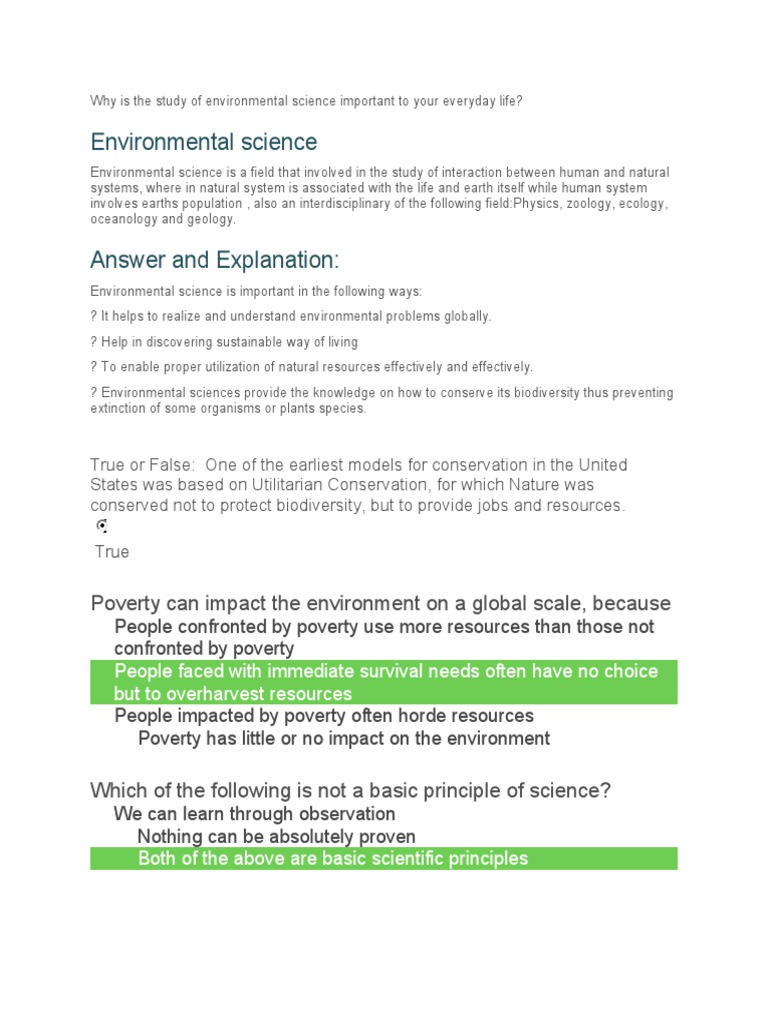The question of whether to study environmental science or biology encapsulates a crossroads in academic pursuit, with both disciplines offering profound insights into the mechanics of life and the world that sustains it. As society grapples with pressing global challenges—climate change, biodiversity loss, and environmental degradation—the decision becomes increasingly complex. To navigate this multi-faceted landscape, one must consider the inherent distinctions and interconnections between these fields, paying close attention to the implications of each on our collective future.
At its core, biology is the scientific study of living organisms, encompassing various aspects such as structure, function, growth, evolution, and distribution. It operates on a micro to macro scale, delving into cellular processes through to ecological relationships. On the other hand, environmental science is an interdisciplinary field that integrates biological principles alongside those from the physical sciences, social sciences, and policy studies. It aims to understand and mitigate human impacts on the environment. Hence, the decision to choose one over the other necessitates a contemplation of personal interests, career aspirations, and the broader societal implications of each discipline.
For instance, individuals with a proclivity for delving into the intricacies of life forms may find biology particularly enticing. This field fosters an appreciation of the immense diversity and adaptability of life. From the minutiae of metabolic pathways to the vast interconnections of ecosystems, biology presents a mosaic of knowledge that appeals to those drawn to nature’s complexity. Biology cultivates critical analytical skills that can be applied in various subsequent domains, including medicine, biotechnology, and ecological research. More importantly, the realm of biology provides a foundational framework to understand the principles of life, paving the way for advancements in health care, agriculture, and conservation.
Conversely, students with a penchant for examining the interactions between humans and their environments may gravitate toward environmental science. This field offers a unique lens through which to appreciate the anthropogenic influences that shape our planet. It fosters a holistic understanding of ecological systems while emphasizing the urgent need for sustainable practices. Environmental science merges ecology, geology, atmospheric sciences, and social sciences, making it inherently versatile and impactful. It equips students with the knowledge to advocate for effective public policies and innovative technologies that address environmental crises.
Nonetheless, a cursory examination of either field reveals that they are not mutually exclusive; rather, they are deeply intertwined. For example, understanding ecological principles through biology is pivotal for comprehending environmental issues. A robust grasp of biodiversity, species interactions, and evolutionary processes can greatly enhance one’s ability to evaluate ecological risks and the potential ramifications of environmental policy decisions. Moreover, biology informs conservation efforts and biodiversity management, providing the empirical evidence necessary to advocate for the preservation of endangered species and ecosystems.
Moreover, the ethical dimensions of both fields cannot be overlooked. Engaging with biological sciences often raises pertinent ethical questions regarding genetic manipulation, cloning, and conservation practices. Environmental science similarly grapples with the ethical implications of resource management, pollution, and land use. Students must confront these dilemmas, fostering a moral responsibility toward future research and policy-making. This ethical engagement adds a layer of depth to the academic experience and cultivates a well-rounded perspective that transcends scientific boundaries.
Career opportunities associated with biology and environmental science further influence the decision-making process. Biology graduates may pursue roles in healthcare, pharmaceutical industries, or research, while environmental science graduates often find themselves working with governmental agencies, NGOs, and corporations focused on sustainability. The burgeoning field of environmental consultancy presents a promising avenue, as it combines knowledge from both disciplines. Ultimately, factors such as job availability, societal needs, and personal ambitions should significantly inform one’s decision.
In examining the broader societal context, the urgency surrounding environmental issues cannot be overstated. The devastating effects of climate change, loss of biodiversity, and pollution underscore the necessity for skilled professionals who can navigate these crises. Environmental scientists are on the frontline, advocating for informed policies and sustainable practices. However, as society increasingly demands innovative solutions, biologists will also play a crucial role in addressing these challenges, particularly through biomedical advancements and agricultural improvements that align with ecological principles.
The synergy between environmental science and biology reveals an intriguing convergence of ideas. Interdisciplinary programs that encompass both fields are becoming increasingly common, catering to the multifaceted nature of contemporary environmental challenges. This confluence beckons to students who possess dual interests and fosters a collaborative approach that could potentially yield comprehensive solutions to the problems plaguing our planet.
Ultimately, the decision between studying environmental science and biology must be guided by self-reflection and a keen awareness of one’s own passions, career aspirations, and the global context in which these disciplines operate. Each field presents not only a path of academic inquiry but also an avenue for contributing meaningfully to society. Whether one chooses the intricate pathways of biology or the overarching frameworks of environmental science, both disciplines offer a compelling opportunity to engage with the world—understanding it more deeply, and, perhaps, even rectifying its most pressing dilemmas.










